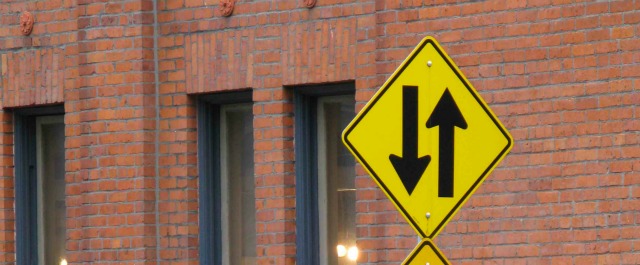
Photo (cc) Oran Viriyincy
National Post: Taking a u-turn on the one-way street
Two years ago, city crews went to St. Paul Street – the one-way spine of downtown St. Catharines, Ont. – took down the “no entry” signs, painted new lines and opened up the street to two-way traffic. According to planners, it would slow cars down, make the downtown more pedestrian friendly and spur retail development.
St. Catharines was only following the example of hundreds of cities in the United States and Canada that have been shutting down their one-way streets since the 1990s. In Ottawa last week, planners announced they are considering the two-way conversion of several streets in the shadow of Parliament Hill. Two-way roads would help to “‘normalize’ the streets, by slowing traffic, creating a greater choice of routes, improving wayfinding, creating a more inviting address for residential and commercial investment and improving safety for pedestrians and cyclists,” according to a plan drafted by consulting firm Urban Strategies Inc. […]
The New York Times: Paved, but Still Alive
Absent hard numbers Mr. Ben-Joseph settles on a compromise of 500 million parking spaces in the country, occupying some 3,590 square miles, or an area larger than Delaware and Rhode Island combined. If the correct number is 2 billion, we’re talking about four times that: Connecticut and Vermont.
As the critic Lewis Mumford wrote half a century ago, “The right to have access to every building in the city by private motorcar in an age when everyone possesses such a vehicle is the right to destroy the city.” Yet we continue to produce parking lots, in cities as well as in suburbs, in the same way we consume all those billions of plastic bottles of water and disposable diapers.
The Hill: Schumer pushes for commuter tax extension
New York Sen. Charles Schumer (D) wants Congress to get on board with an extension of a tax benefit for public transit users.
Schumer suggested that Thursday that lawmakers should use a package of pending tax breaks to extend a provision from the 2009 economic stimulus package that allowed public transit users to set aside $230 per month before taxes for commuting expenses. Because Congress has not yet extended the provision, which expired on Jan. 1, the limit was reduced to $125 at the beginning of the new year.
MSNBC: White House wants to convert foreclosed houses to rentals
The Obama administration, in conjunction with federal regulators and led by the overseer of Fannie Mae and Freddie Mac, are very close to announcing a pilot program to sell government-owned foreclosures in bulk to investors as rentals, according to administration officials.
There are currently about a quarter of a million foreclosed properties on the books of Fannie Mae, Freddie Mac and the Federal Housing Administration (FHA) and millions more are coming.





Add comment